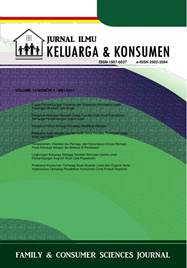PENGARUH FAKTOR EKOLOGI TERHADAP RESILIENSI REMAJA
Abstract
Youth nowadays are increasingly required to have a resiliency in order to prevent disturbance in their developmental task, quality of life, and their future. This research aimed to elaborate youth resiliency and influence of ecological factors on their resiliency. Using quantitative design, this research was conducted during September 2015 – January 2016. Total 120 teenagers were generated through multi-stage random sampling technique. Primary data was collected through survey using researcher-developed questionnaire. Results showed that youth ecological factors such as subjective well-being, internal protective factor (including self-acceptance, environment acceptance, self-confidence, achievement, discipline, self-ability), external protective factors (including parenting, family , school , peer group, and society environment), involvement of children in juvenile delinquency, family income, father’s length of education, administrative areas, and types of schools were associated with youth resiliency. Furthermore, external protective factors (from school, and parenting), and youth internal protective factors have a positive significant effect on youth resiliency. Specific regression analysis the influence family protective factor on youth resiliency showed that moral-religious orientation, cohesion, and achievement orientation have a positive significant effect on youth resiliency.Copyright (c) 2017 Jurnal Ilmu Keluarga & Konsumen

This work is licensed under a Creative Commons Attribution-ShareAlike 4.0 International License.
Authors submitting manuscripts should understand and agree that copyright of manuscripts published are held Jurnal Ilmu Keluarga dan Konsumen. The statement to release the copyright to Jurnal Ilmu Keluarga dan Konsumen is stated in Copyright Release Form. Copyright encompass exclusive rights to reproduce, to distribute, and to sell any part of the journal articles in all form and media. The reproduction of any part of this journal is allowed with a written permission from Jurnal Ilmu Keluarga dan Konsumen.









